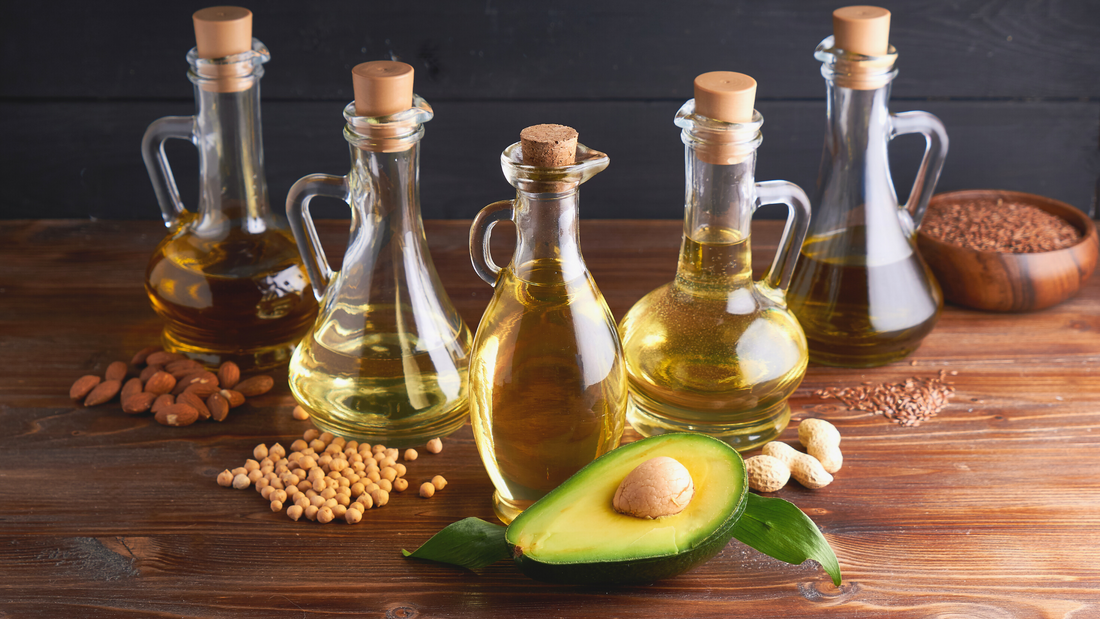5 Reasons to Minimize or Eliminate Oil From Your Diet + Oil Substitutes

Oils, especially olive oil, have commonly been referred to as a health food. One of the defining characteristics of a whole food plant-based diet is minimizing or eliminating all oils in your diet. Here are 5 reasons to minimize or eliminate oil from your whole food plant-based diet:
1. High Caloric Density
Oil is the most calorically-dense food that we have available to us. Oil is 100% pure fat and 120 calories and 14g of fat per tablespoon, which is about 2,000 calories per cup. While two-thirds of the U.S. and one-third of the world are either overweight or obese, and most of us are trying to reduce calories, avoiding or minimizing oil is the easiest way to cut out hundreds or thousands of calories from your diet.
2. Omega-3 to Omega-6 Ratio
We tend to get too much Omega-6 and not enough Omega-3 in our diet. Ideally we want the ratio to be about 1:2 to 1:4 of Omega-3 to Omega-6. Most of the vegetable oils we consume have a lot of Omega-6, and little to no Omega-3. Minimizing or eliminating oil is another way to help improve that ratio for optimal inflammation properties in the body.
3. Rancidity
High fat foods are very susceptible to oxidation from the environment. If you break down a high fat food and you spread it out there’s more susceptibility to oxidation. When you're consuming things that are oxidized you have more free radicals in your body and that enhances inflammation and the chronic disease process. You can’t tell necessarily if an oil has gone rancid by it’s smell or flavor, so opting out of oil is just an easy way to avoid or minimize your exposure to these free radicals.
4. Processed food
Oils are technically a processed food. Take a whole olive for instance. It has fiber and phytonutrients that are all intact. But if you take out just the oil you’re losing so much of those nutrients; in fact, most of those nutrients are stripped away and there is no fiber left. So if you want to be full and eat less and more nutrient-dense overall, the best thing you can do is cut out the oils.
5. (BONUS) Difficult to clean
A bonus practical reason to minimize or avoid oil is oil is its difficulty to clean. When you clean your pots, plates, and utensils, oil often leaves a residue and is difficult to wash off. Oils also stain your clothes.
Oil Substitutes
Here are a few easy ways to substitute oil when cooking:
1. Sautéing
It's still possible to brown and caramelize without using oil. Eliminate oil when sautéing and use water or vegetable broth instead. Watch this video to learn how...
2. Baking
Substitute oil and butter with fruit purees, bananas, avocado, unsweetened applesauce, ground flax or chia, whole nut butters, or tahini. Check out this recipe for oil-free baked oat bread.
3. Salad dressings
The most powerful inspiration to eat more veggies (and love them, too) is a delicious dressing or sauce. Since veggies have the most nutritional bang for their caloric buck compared to all other foods, any excuse to eat more is a health-promoting win-win. Check out these 18 oil-free salad and sauce recipes.
4. Roasting
Oil isn’t a necessary ingredient to roasting your favorite veggies in the oven or getting them to be crispy. Just give them a little more time in the oven and if you want to use a substitute liquid, try using lemon or lime juice, vegetable broth, or soy sauce. Check out this recipe for oil-free roasted vegetables.
Whole Harvest delivers fresh, chef-prepped meals to your door to make eating healthy convenient and easy. Check out our rotating menu.
